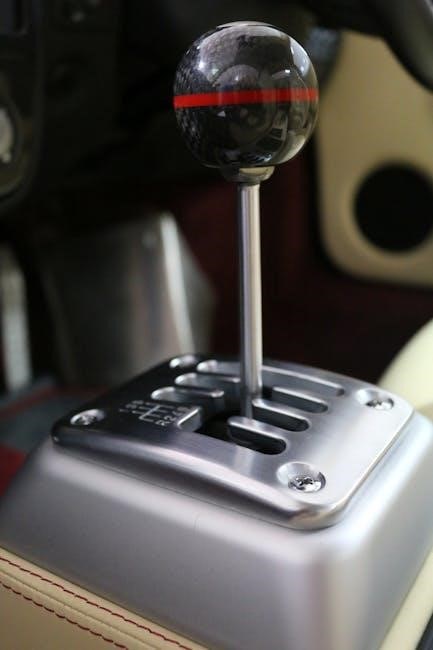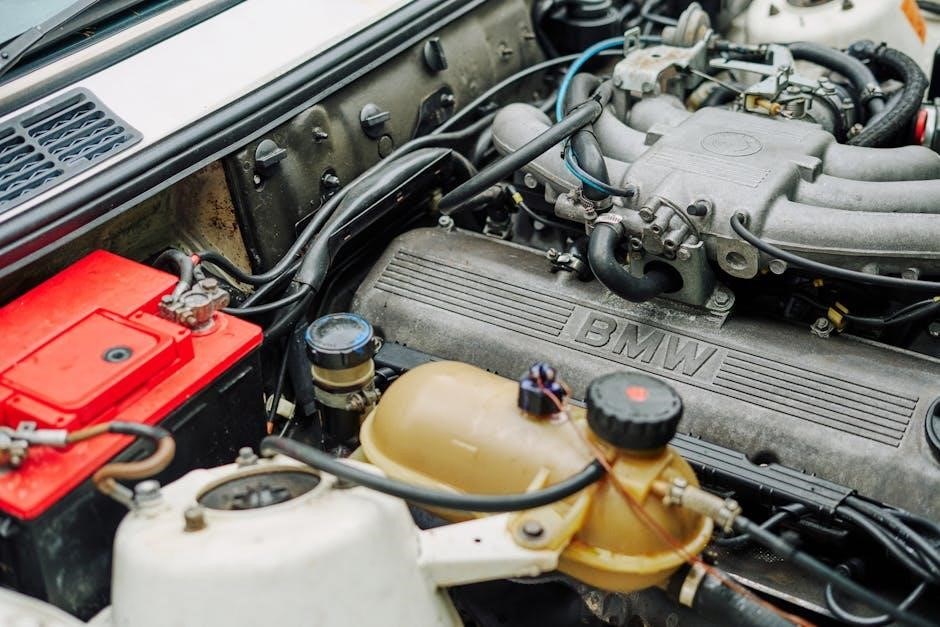Firearm modification manuals provide detailed instructions for customizing guns, focusing on technical aspects and legal compliance to ensure safe and regulated alterations.
Overview of Firearm Modification Guides
Firearm modification guides, such as the “full auto modification manual PDF,” offer step-by-step instructions for altering firearms to enhance performance, functionality, or aesthetics. These guides often cover technical aspects like trigger systems, barrel modifications, and stock customizations. They cater to gun enthusiasts, competitive shooters, and individuals seeking personalized firearms. However, such manuals emphasize the importance of adhering to federal, state, and local laws to avoid legal repercussions. Modifications must comply with regulations to prevent the creation of illegal firearms, such as machine guns. Users are cautioned against unsafe or prohibited alterations, as these can lead to criminal charges or complications in self-defense cases. Proper research and legal awareness are essential before attempting any modifications.
Importance of Legal Compliance in Firearm Modifications
Legal compliance is paramount in firearm modifications, as outlined in resources like the “full auto modification manual PDF.” These documents stress that altering firearms must adhere to federal, state, and local laws to prevent legal consequences. Unauthorized modifications, such as converting a semi-automatic to a fully automatic firearm, can lead to severe penalties, including criminal charges and confiscation of the weapon. Compliance ensures that modifications do not inadvertently create illegal firearms, which can result in felony convictions. Additionally, legal adherence is crucial for maintaining the legitimacy of self-defense claims, as illegal modifications may undermine a defendant’s case. Therefore, understanding and following legal guidelines is essential for responsible firearm customization.

Legal Considerations for Firearm Modifications
Firearm modification laws are complex, requiring adherence to federal, state, and local regulations to avoid criminal penalties and ensure compliance with established legal standards for alterations.

Federal Laws Governing Firearm Modifications
Federal laws strictly regulate firearm modifications, particularly those that alter a weapon’s functionality. The National Firearms Act (NFA) prohibits converting semi-automatic firearms into fully automatic weapons without proper authorization; Modifications that create unregistered machine guns or short-barreled rifles are illegal. The Bureau of Alcohol, Tobacco, Firearms and Explosives (ATF) enforces these regulations, ensuring compliance with strict guidelines. Any alteration that changes a firearm’s classification under the NFA requires prior approval. Violations result in severe penalties, including fines and imprisonment. Understanding these federal laws is crucial to avoid legal consequences when modifying firearms. Owners must ensure all changes comply with ATF standards to maintain legality and safety.

State-Specific Regulations on Firearm Alterations
State laws regarding firearm modifications vary significantly, adding complexity to compliance. Some states prohibit certain alterations outright, while others impose stricter regulations than federal laws. For instance, California and New York have stringent rules against modifications that enhance firepower or conceal firearms. Certain states ban features like bump stocks or high-capacity magazines, which may be legal under federal law. Additionally, some jurisdictions require permits for specific modifications, while others mandate registration of altered firearms. It’s essential for gun owners to familiarize themselves with local regulations to avoid unintentional violations. Non-compliance can lead to severe penalties, emphasizing the need for thorough understanding of both federal and state-specific laws when modifying firearms. This ensures legal adherence and public safety.
Prohibited Modifications Under Federal and State Laws

Federal and state laws strictly prohibit certain firearm modifications to prevent illegal enhancements and ensure public safety. Under the National Firearms Act (NFA), converting a firearm to fully automatic operation or adding features like silencers, short-barreled rifles, or explosive devices without proper registration is illegal. Similarly, state laws often ban modifications that increase firepower, such as bump stocks or high-capacity magazines. Alterations that conceal a firearm’s identity or make it more lethal, like sawed-off shotguns, are also prohibited. Non-compliance with these regulations can result in severe penalties, including felony charges and firearm confiscation. It is crucial to consult both federal and state laws before making any modifications to avoid legal consequences.

Technical Aspects of Firearm Modifications
Firearm modifications involve precise technical adjustments, such as trigger pull tuning and barrel enhancements, to improve performance and functionality, requiring skilled expertise and specialized tools.
Trigger Pull Modifications and Their Implications
Trigger pull modifications aim to enhance firearm performance by adjusting the weight and sensitivity of the trigger mechanism. These modifications can improve accuracy and control, particularly in competitive shooting or self-defense scenarios. However, altering the trigger pull must be done cautiously to avoid unintended discharges or legal issues. Federal and state laws strictly regulate modifications that could lead to fully automatic functionality or unsafe conditions. Prosecutors in legal cases may scrutinize trigger modifications, potentially using them to argue recklessness or negligence. Gunsmiths and owners must ensure modifications comply with legal standards and prioritize safety to prevent adverse legal consequences. Expert guidance is crucial to navigate the complexities of trigger adjustments.
Barrel Modifications for Enhanced Performance
Barrel modifications are popular for enhancing accuracy, stability, and overall performance of firearms. Common upgrades include threading for muzzle brakes or suppressors, porting to reduce recoil, and installing precision barrels. These changes can improve handling and consistency, especially in competitive shooting or tactical applications. However, modifications must comply with federal and state laws, as altering barrel length or threading can lead to legal issues. For instance, short-barreled rifles require special permits under the National Firearms Act. Owners should consult legal guidelines and expert gunsmiths to ensure modifications remain lawful and safe. Proper documentation and adherence to regulations are essential to avoid legal complications. Enhanced performance through barrel modifications offers significant benefits when executed responsibly.
Stock and Grip Customization for Better Handling
Stock and grip modifications are essential for improving firearm ergonomics and control. Custom stocks can be tailored to fit the shooter’s shoulder and posture, enhancing stability during aiming and firing. Grips are often upgraded to provide better texture, reducing slippage and improving handling, especially in wet conditions. Thumb rests, palm swells, and adjustable cheek risers are common enhancements. These modifications are particularly popular among competitive shooters and law enforcement, as they enhance accuracy and reduce fatigue. However, enthusiasts must ensure compliance with local laws, as certain modifications, like collapsible stocks on restricted firearms, may violate regulations. Proper research and consultation with firearms experts are crucial to avoid legal issues while optimizing comfort and performance.


Consequences of Non-Compliant Modifications
Non-compliant firearm modifications can lead to severe legal penalties, including fines and imprisonment, and may void manufacturer warranties, compromising safety and reliability.

Legal Ramifications of Illegal Firearm Modifications

Illegal firearm modifications, such as converting a firearm to fully automatic operation, carry severe legal consequences under federal and state laws. Violations of the National Firearms Act (NFA) can result in criminal charges, hefty fines, and imprisonment. Modifying a firearm without proper authorization or registration is a felony, potentially leading to a prison sentence of up to 10 years. Additionally, illegal modifications can void warranties and compromise safety. Courts may view such alterations as evidence of intent to commit harm, complicating legal defenses in self-defense cases. Prosecutors often use modifications to argue recklessness or premeditation, increasing the likelihood of harsher penalties. Legal ramifications underscore the importance of adhering to firearm regulations to avoid severe consequences.
Firearm modifications can significantly influence self-defense cases, often complicating legal proceedings. Prosecutors may argue that modifications, such as trigger adjustments or custom parts, indicate premeditation or recklessness, undermining a defendant’s claim of justified use of force. Jurors unfamiliar with firearms may perceive modifications as aggressive or unnecessary, potentially swaying their verdict. Courts have seen instances where modified weapons are presented as evidence of intent to harm, even if the modification itself is legal. This highlights the importance of understanding both legal and practical implications before altering a firearm used for self-defense. Legal counsel often advises keeping defensive weapons in factory condition to avoid adverse inferences in court.Impact of Modifications on Self-Defense Cases
